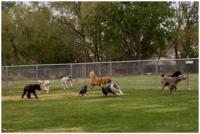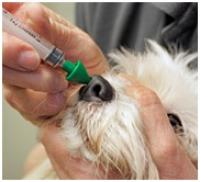Kennel Cough
“Kennel cough” is a common term used for a disease complex involving a respiratory infection. Several different bacteria and viruses can cause it. It is also called “infectious tracheobronchitis” meaning an infection of the airway (the trachea and bronchi).
It’s called kennel cough because it’s highly contagious, dogs are much more likely to be infected in crowded areas such as a kennel, and a cough is the classic sign.
A better term that’s used more often now is canine infectious respiratory disease (CIRD). This explains it better since the disease isn’t always just a cough and may extend into the lungs. Kennel cough is much easier to say, though!
How it’s spread
Dogs can shed these organisms before they show signs of illness. That means they are contagious before you know they are sick. This makes it easy for them to spread the infection around. They continue to shed for generally 7-14 days afterwards. This allows plenty of time to infect other dogs.
Droplets from the respiratory tract of a sick dog spread these infections. The droplets come from sneezing, coughing, or sharing a water bowl.
A dog can also get the organism from a contaminated object such as a kennel that hasn’t been disinfected completely, or bedding shared by dogs. Coughing and sneezing can spread these organisms readily and we haven’t figured out how to teach dogs to cover their mouths!
Signs
Coughing is the most common sign seen. It is often hacking, comes on suddenly, and the dog may have a “honking” sound. Often the dog will gag at the end of a coughing spell and may spit up some foamy, white mucous.
The throat is sensitive and lightly feeling it will often trigger a coughing spell. Dogs will often cough more if they exercise. In mild forms, the dog is feeling fine and eating normally. The cough may linger for several weeks even after the infection is gone.
Dogs may also be sneezing, have a watery discharge from their nose, or runny eyes. They may have tonsillitis or an inflamed throat.
Treatment
For many cases, the disease will run its course and your dog will get better if you do nothing. However, taking some steps to minimize stress will help him to avoid complications or keep the disease from worsening.
Make him rest, little exercise (just enough to potty), reduce excitement, and don’t let him pull on a collar on his neck. All of these things will help to reduce coughing fits and lessen irritation to his throat.
Antibiotics are usually not needed unless your dog has a low immune system or he has pneumonia. Antibiotics usually won’t make a difference. Cough suppressants may be needed if your dog is coughing excessively. This will help everyone sleep better and reduces the irritation to his throat. Narcotic type cough suppressants must be used cautiously, though, as they can make breathing more difficult.
Vaccination
Vaccines are available for several of the organisms that can cause kennel cough. The distemper/parvo combo that all dogs should receive protect against distemper and adenovirus type 2. Both of these are viruses that can cause or aggravate a kennel cough problem though that’s not their primary disease.
Some of those combo vaccines also include parainfluenza, a virus that causes kennel cough.
Bordetella bronchiseptica is a bacteria and one of the more common causes of kennel cough. Bordetella is the vaccine that many people call the kennel cough vaccine. Bordetella vaccines can be combined with parainfluenza and adenovirus2.
If you want to avoid giving your dog a duplicate vaccination, ask your vet if something is included with Bordetella. Bordetella vaccines are available as an injection or intra-nasal, liquid that goes in the nose.
Summary
If your dog gets kennel cough, keep him away from other dogs for two weeks after exposure. He shouldn’t go to the groomer, for boarding, or to the dog park. Keep exercise and activity to a bare minimum. It’s kind of like us having a cold: rest, and plenty of fluids!
Dogs cough for other reasons than kennel cough. Contact your veterinarian if you aren’t sure what it is or if your dog is acting sick (besides the cough).
All articles are reviewed and maintained by whiskerDocs team of veterinary experts.





